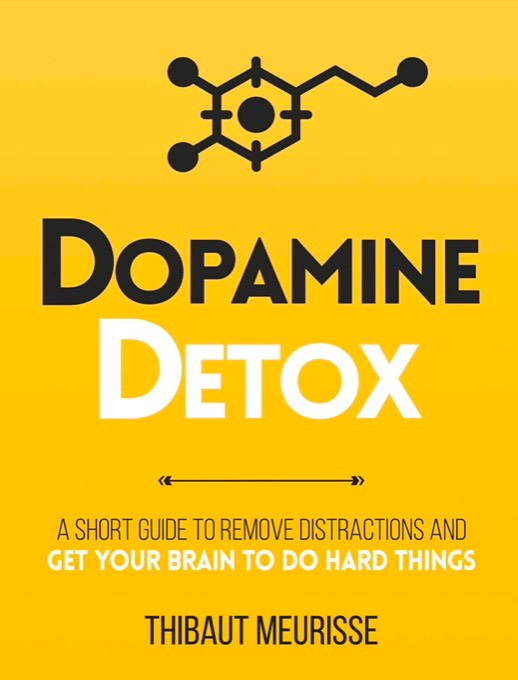Book Freak 142: How to Get Your Brain to Do Hard Things
Advice from Dopamine Detox by Thibaut Meurisse

Dopamine Detox, by Thibaut Meurisse, explains how overstimulation from modern technology and activities can overactivate the brain’s dopamine system, making it harder to focus and do deep work. It advocates reducing stimulating inputs through a “dopamine detox” to recalibrate the brain’s reward system. Benefits include improved concentration, decreased procrastination, and achieving more meaningful goals. The method involves identifying your biggest distractions, adding friction to make them harder to access, and replacing them with calming activities like walks, meditation, and reading.
A detox can last as short as an hour, or up to 30 days, according to Meurisse, but the most common time frame is 48-72 hours. The longer and more intensive the detox, the more it will reset your dopamine levels and break obsessive habits.
Here is a step-by-step guide on how to do a dopamine detox:
- Identify your biggest distractions and temptations. Make a list of activities and inputs that tend to overstimulate you and lead to procrastination. These might include social media, YouTube, news, email, etc.
- Add friction to make those distractions harder to access. For example, delete apps off your phone, block certain websites, turn off notifications, put your phone in another room.
- Replace distractions with calming activities. Plan what you will do instead, like taking a walk, meditating, reading, stretching, writing in a journal, etc.
- Start your detox, ideally first thing in the morning, before getting overstimulated. Turn off/avoid distractions and do calming activities instead.
- When cravings arise, observe them mindfully without judging yourself. Refocus on your breath or the present moment.
- If you relapse, gently start again. Don’t beat yourself up. Reset with calming activities.
- After the detox, put sustainable habits in place. For example, keep notifications off, avoid starting your day on social media, schedule time for focused work.
The key is to gradually decrease stimulation to recalibrate your brain’s reward system. Then you can focus better, procrastinate less, and work consistently on what matters.
Social media hijacks your dopamine neurotransmitters
“Social media notifications are a great example of how your brain is being hijacked. Whenever you see a notification, you anticipate the reward you’ll receive when clicking on it, which triggers the release of dopamine in your brain. However, this doesn’t make you happy or fulfill you—at least not for long. Remember, dopamine is not a pleasure chemical; it is a neurotransmitter that is activated when you anticipate a potential pleasure. And that pleasure is usually temporary. Below are some other ways your dopamine neurotransmitters are being hijacked”
Don’t fall for your mind’s excuses to seek more stimulation
“As soon as you enter a state of overstimulation, your mind will play tricks on you to convince you there is no need to leave that ‘trance.’ Instead, your mind encourages you to embrace it and seek even more stimulation. After all, we have to enjoy life, right?”
Constant feedback distorts your perception of time and reality
“By receiving constant feedback, whether through likes, comments, or immediate replies to our messages, we condition ourselves to expect fast results with everything we do. And this feeling is certainly reinforced through ads for schemes to help us ‘get rich quick,’ and through cognitive biases (i.e., we only hear about the richest and most successful YouTubers, not about the ones who fail).”
Reduce friction to make desired tasks easier to start
“Make your desired behaviors as frictionless as possible. For instance, to facilitate writing in the morning, I avoid checking my phone or my emails and leave my word processor open. Then, I often put on relaxing music and use a timer (I like to do 45-minute work sessions). By doing so, I’ve removed friction and obtained the buy-in from my mind. It wouldn’t make sense if I suddenly stopped the music, paused the timer, and moved on to another activity. My mind would see it as a waste of energy. Of course, I may still procrastinate, but removing friction and creating a simple routine reduces the chances of me doing so.”
10/25/23





